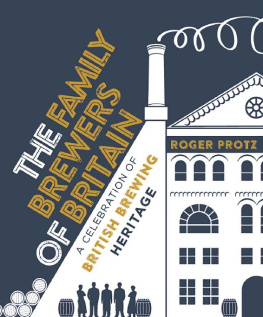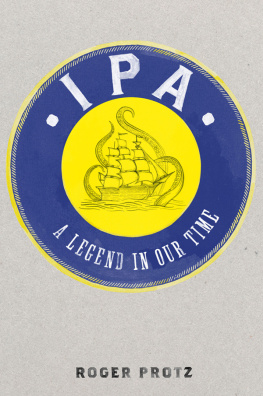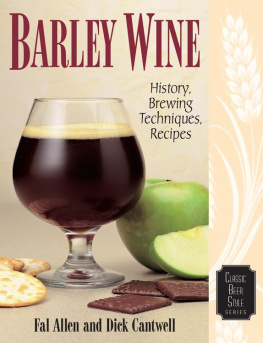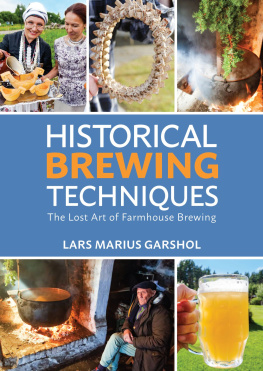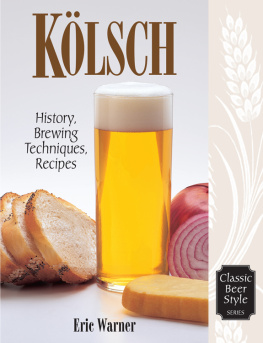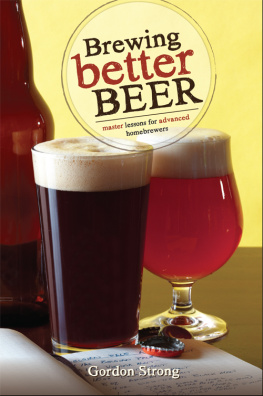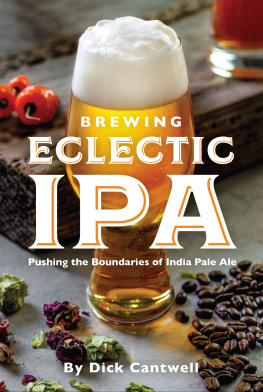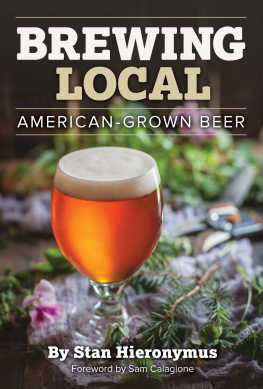
THE
FAMILY BREWERS
OF BRITAIN
A Celebration of
British Brewing Heritage

ROGER PROTZ

Published by the Campaign for Real Ale Ltd
230 Hatfield Road, St Albans, Hertfordshire AL1 4LW
www.camra.org.uk/books
Campaign for Real Ale Ltd. 2020
Text Roger Protz
First published 2020
The right of Roger Protz to be identified as the author
of this Work has been asserted by him in accordance
with the Copyright, Designs and Patents Act 1988.
All rights reserved.
No part of this publication may be reproduced, stored in a retrieval system or transmitted in any form or by any means electronic, mechanical, photocopying, recording or otherwise without the prior permission of the Campaign for Real Ale Ltd.
ISBN 978-1-85249-359-2
A CIP catalogue record for this book is available from the British Library
Printed and bound in the Czech Republic by Latitude Press Ltd.
Managing Editors: Katie Button and Alan Murphy
Project Editor: Julie Hudson
Book design/typography: Dale Tomlinson
Cover: Mulberry Advertising
Sales & Marketing: Toby Langdon
Every effort has been made to ensure the contents of this book are correct at the time of printing. Nevertheless, the Publisher cannot be held responsible for any errors or omissions, or for changes in the details given in this book, or for the consequences of any reliance on information provided by the same.
This does not affect your statutory rights.
PICTURE CREDITS
The publisher would like to thank all the breweries and others who have kindly given permission for their photography and artwork to be printed in this publication. We are especially grateful to the Brewery History Society ( breweryhistory.com ) for its assistance in sourcing historical images for the book. Specific thanks go to:
(Key: t = top, b = bottom, c = centre, l = left, r = right)
Anonymous, 1819 128(l); Simon Barber 189(t); Geoff Brandwood 226(t); Brewery History Society 7(all), 9(all), 34(t), 35, 40, 42(t,c,b), 43(t), 44, 45(t,c,b), 46, 47, 62(c), 125(t), 141(tr,b), 146(t), 149(t), 171(l), 176(t), 231(r), 236(c), 243, 244(b), 253(bl); Adam Bruderer/flickr (CC BY 2.0) 123(t); tom_bullock/flickr (CC BY 2.0) 121; George Cruikshank, 1821 8(t); Anthony Cullen 182, 187(t); Dunk/flickr (CC BY 2.0) 10(bcr: Threlfalls); Robert Foyers 185(br), 189(b); Tim Green/flickr (CC BY 2.0) 31(br), 104(tb); Trevor Hatchett 272; tpholland/flickr (CC BY 2.0) 37(b); Paul Horton 234; Imperial War Museum 208(b); brett jordan/flickr (CC BY 2.0) 150(t); Alex Liivet/flickr (CC BY 2.0) 253(cl); Jim Linwood/flickr (CC BY 2.0) 78; Stephen J Mason Photography/ flickr (CC BY-SA 2.0) 238(b); Metro Centric/flickr (CC BY 2.0) 240(t); Mooganic/flickr (CC BY 2.0) 256(b); Mark Newton Photography (courtesy of Black Sheep Brewery) 222(t), 224(tl,cr,br), 225(tl); Roger Putman 52, 135(t), 148(t), 164(t), 177, 226(b), 228, 240(b), 242(t), 243, 244(t) 247(t); Reading Tom/flickr (CC BY 2.0) 10(br: Wethered); Robinsons 120, 122, 123(b), 124, 126, 127, 128(br), 129(t,b); Sgobbone/flickr (CC BY-SA 2.0) 60; Emma Sweet 43(b); tomline43/flickr (CC BY 2.0) 179; Dale Tomlinson 66, 74, 99; Unknown, May 16 1942 Billboard magazine 209; vagueonthehow/flickr (CC BY 2.0) 27, 136; Willem van de Velde II, 1691 185(bl); Ed Webster/flickr (CC BY 2.0) 201(l), 202(cl,bl); chris weger/flickr (CC BY-SA 2.0) 168
Contents
Preface
T HIS BOOK is a celebration of the remarkable family brewers of Britain. They are the great survivors who have flown the flag for good beer during world wars, recessions and merger mania. Today some thirty are still in production and their main beers are the cask ales that make Britain a unique brewing nation.
The family brewers have not been passive observers of social change over the past 300 years. They have been at the cutting-edge of profound changes in the demand for beer and the way its produced. Some of the brewers in this book were participants in the great porter revolution of the 18th century that led to the rise of the mass market in beer. A century later, brewers grasped new technologies in malting and beer-making to fashion the worlds first pale ales, several decades ahead of golden lager in central Europe. In more recent times, family brewers have withstood attempts to buy them and close them, have seen off the challenge of keg beer and fake lager, and now embrace the exciting new styles of beer sought by drinkers both young and old.
ROGER PROTZ, 2020
This book has been produced with the support of the Independent Family Brewers of Britain: most but not all the breweries featured are members of the IFBB. I would like to thank the brewers who gave their time to discussing their histories and plans for the future and who welcomed me to their breweries and gave me tours of their plants. Particular thanks are due to Rick Bailey, chairman of the IFBB, and Caroline Nodder, the press and publicity officer, for their help and their enthusiasm for the project.

INTRODUCTION
The rise and resilience of Britains
family brewers
T HE ROOTS of the family brewers of Britain lie in the Industrial Revolution, a turbulent period of the islands history that transformed it socially and economically. From the 1760s, Britain moved from an agrarian economy to a manufacturing one and it became the powerhouse of the world with a large trading empire. The country made textiles on a vast scale for domestic use and for export while a new industrial working class dug coal, forged iron and steel, and built ships. They also brewed and consumed beer in enormous quantities to slake thirsts created by long hours of back-breaking labour.
Demand outstripped supply
In the Georgian period brewing was a small-scale occupation. It was conducted by licensed victuallers publicans who paid a licence fee to brew on their premises, usually the cellars of their pubs and in private houses. But as workers poured into rapidly expanding towns and cities to work in factories, mills and foundries, demand outstripped supply. Commercial or common brewers sprang up to produce beer in unprecedented volumes.
By the late 18th century there were 746 common brewers registered in the country and the number grew during the following century. When Queen Victoria came to the throne in 1837, commercial brewers in England and Wales produced around 55 per cent of beer output, licensed victuallers 33 per cent and beerhouses around 12.5 per cent. By the end of Victorias reign in 1901, commercial brewers accounted for 95 per cent of production.
Almost without exception, the new commercial brewers were family businesses. The famous names of the 18th and 19th centuries, such as Allsopp, Barclay Perkins, Bass, Charrington, Courage, Greene King, Truman, Whitbread and Worthington, started out as family concerns until the need to expand turned them into public companies.

The increase in the amounts of beer produced reflected the growth in population, which in England more than doubled from 8.3 million in 1801 to 16.8 million by 1850, and then grew to 30.5 million by 1901. Apart from in isolated rural areas and some small towns, it was impossible for publican brewers and beerhouses, relying on small wells and rudimentary equipment, to meet the insatiable demand from consumers. In sharp contrast, the commercial brewers not only grew apace but were able also to make beer of greater quality and consistency, using new technologies unleashed by the Industrial Revolution.
Next page
